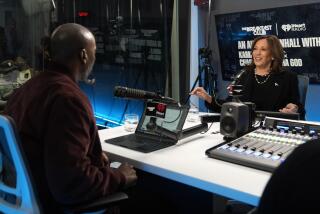Gore Talks About Crime, Attacks Bush’s Drug War
- Share via
NEW ORLEANS — From early morning into late night, in appearances before students, business owners and others across Louisiana, Democratic vice presidential nominee Al Gore tried Wednesday to stick with his daily message on crime and drugs.
It wasn’t easy. Those he met often seemed more interested in discussing race relations, the economy, even offshore oil drilling.
Gore attacked the Administration’s drug-fighting efforts as ineffective, called its drug czar “a political crony” and admitted that federal drug policies appear to disproportionately target blacks.
“What we have seen is a decision by the President to appoint, not a law enforcement professional, not a drug abuse professional, but a defeated political crony to head the war against drugs,” Gore told a class in Shreveport, La. Though he never mentioned his name, Gore apparently referred to former Florida Gov. Bob Martinez.
Gore also acknowledged, in response to a question, that the White House-led war on crime has resulted in disproportionately more blacks being arrested on drug charges than other Americans. But he carefully avoided casting the issue in racial terms.
“I think the way that the war against drugs has been pursued has emphasized . . . the people on the street in the areas where they are most accessible to law enforcement officers, and has not focused on the deeper causes of the drug problem,” he said. “I think that has led to the kind of disparity that . . . doesn’t concentrate on the demand side as it does on the supply side and doesn’t concentrate on the big operators the way it concentrates on the smaller operators.”
Gore’s staff released a statement setting out the Democrats’ proposal to combat drugs. The plan includes putting another 100,000 police officers on the streets, passing gun-control legislation, stanching the flow of drugs across the borders, and boosting funds for drug treatment and education.
“Three years ago this week, George Bush waved a bag of crack cocaine on national TV and promised to fight a war on drugs,” Gore’s statement said. “When it comes to fighting drugs, all George Bush has given us is a phony war with real casualties.”
At Gore’s first stop, the assembly at Capt. Shreve High School in Shreveport, the junior and senior students listened to the anti-crime message, but seemed most animated discussing race relations, job formation and abortion.
At one point, a student told Gore the government had no role in changing individual attitudes on racial issues.
“Well, I don’t entirely agree with that,” Gore replied.
During his lunch meeting with business owners in Baton Rouge, the economy and small business concerns took center stage. Gore and his staff appeared pleased because it allowed the candidate to expound on what he calls the central issue: “jobs, jobs, jobs.”
Even when it appeared Gore had driven home his anti-drug and anti-crime message at Osborne Elementary School in New Orleans, Gore found himself facing a band of local reporters who were more interested in whether he supported a ban on offshore oil drilling--as a GOP attack had alleged.
Gore said he and Democratic presidential nominee Bill Clinton support “a moratorium on new offshore drilling, especially in environmentally sensitive areas,” and accused Bush of continually changing his position.
Later, on CNN’s “Larry King Live,” Gore challenged Bush to show up for debates. The President’s campaign rejected a proposal for three presidential debates last week, saying it wanted fewer of them and a different format.
Gore said he understood Bush’s reluctance. “If you were George Bush, would you want to have to defend your economic record?”
More to Read
Get the L.A. Times Politics newsletter
Deeply reported insights into legislation, politics and policy from Sacramento, Washington and beyond. In your inbox twice per week.
You may occasionally receive promotional content from the Los Angeles Times.










